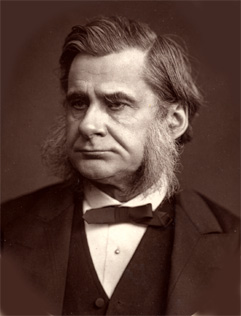Fuente: Autobiography and Selected Essays http://books.google.es/books?id=8xEoY_pWE2kC&pg=PA61. Thomas Henry Huxley. Echo Library, 2006. ISBN 1-4068-0059-7, pág. 61
Frases célebres de Thomas Henry Huxley
Fuente: "The interpreters of Genesis and the interpreters of Nature" (1885) http://aleph0.clarku.edu/huxley/CE4/GeNat.html.
“Prefiero ser el descendiente de dos simios que ser un hombre y tener miedo a enfrentar la verdad.”
Fuente: Citado en: Cyril Bibby: T.H. Huxley: Scientist, Humanist and Educator, Horizon Press (1960) pág. 259
“La ciencia … se suicida cuando adopta un credo.”
Fuente: "The Darwin Memorial" (1885) http://aleph0.clarku.edu/huxley/CE2/DarM.html.
“La vida es demasiado corta como para ocuparse uno mismo de matar lo ya matado más de una vez.”
Durante una serie de interpelaciones cuando Richard Owen repetidamente hacía afirmaciones que repudiaban de modo general el cerebro del gorila.
Fuente: Citado en: Charles Darwin: The Power of Place http://books.google.es/books?id=o0CeYRJnWmYC&pg=PA159, Volumen 2, de E. Janet Browne, Princeton University Press, 2003, ISBN 0-691-11439-0, pág. 159
Fuente: [Richard Owen: Conferencia en la Royal Institution. Athenaeum (13 de abril de 1861) pág. 498; Browne Vol. 2, pág. 159.]
Fuente: Citado en: Contemporary American Religion: A-L Volumen 1 de Contemporary American Religion, de Wade Clark Roof, ISBN 0-02-864928-1, 9780028649283, Macmillan Reference USA, 2000, pág. 12
Frases sobre la ciencia de Thomas Henry Huxley
Fuente: On the advisableness of improving natural knowledge (1866) http://www.gutenberg.org/dirs/etext01/thx1410.txt.
Fuente: T.H. Huxley, The Crayfish: an introduction to the study of zoology. D. Appleton & Co. Nueva York, 1880.
Fuente: Darwiniana: the Origin of Species (1860) http://www.gutenberg.org/dirs/etext04/8thdr10.txt.
Thomas Henry Huxley Frases y Citas
Fuente: The cerebral structure of man and apes; A Succinct History of the Controversy respecting the Cerebral Structure of Man and the Apes]], en: Evidence as to Man's place in Nature (1863)
Fuente: "On the Educational Value of the Natural History Sciences" (1854) http://aleph0.clarku.edu/huxley/CE3/EdVal.html.
Fuente: "On the Educational Value of the Natural History Sciences" (1854) http://aleph0.clarku.edu/huxley/CE3/EdVal.html.
Fuente: "On Descartes' Discourse touching the method of using one's reason rightly and of seeking scientific truth" (1870) http://aleph0.clarku.edu/huxley/CE1/DesDis.html.
Fuente: On the advisableness of improving natural knowledge (1866) http://www.gutenberg.org/dirs/etext01/thx1410.txt.
Fuente: Evidence as to man's place in nature de Thomas Henry Huxley. D. Appelton and company, 1863
Fuente: Carta a Herbert Spencer (22 de marzo de 1886). Citado en: The Life and Letters of Thomas Henry Huxley http://books.google.es/books?id=r6xAaNkOXgAC&pg=PA273, Volumen 2. Leonard Huxley. Echo Library, 2007. ISBN 1-4068-3645-1, pág. 273
Fuente: Thomas Henry Huxley: Ensayo sobre el agnosticismo.
Fuente: "Science and Morals" (1886) http://aleph0.clarku.edu/huxley/CE9/S-M.html.
Thomas Henry Huxley: Frases en inglés
1860s, On a Piece of Chalk (1868)
Fuente: 1860s, Evidence as to Man's Place in Nature (1863), Ch.2, p. 74
1890s
Sydney J. Harris, as quoted in The Routledge Dictionary of Quotations (1989) by Robert Andrews; also quoted as: "...a pleasant place in which to spend one's leisure."
Misattributed
Fuente: 1860s, Evidence as to Man's Place in Nature (1863), Ch.1, p. 36
Fuente: 1860s, Evidence as to Man's Place in Nature (1863), Ch.2, p. 127
“That mysterious independent variable of political calculation, Public Opinion.”
"Universities, Actual and Ideal" (1874) http://aleph0.clarku.edu/huxley/CE3/U-Ac-I.html
1870s
Fuente: 1860s, Evidence as to Man's Place in Nature (1863), Ch.2, p. 86
Fuente: 1860s, Evidence as to Man's Place in Nature (1863), Ch.2, p. 71
Fuente: 1860s, Evidence as to Man's Place in Nature (1863), Ch.2, p. 101
"On the Educational Value of the Natural History Sciences" (1854) p. 29 http://books.google.com/books?id=FJZWAAAAcAAJ&pg=PA29
1850s
Fuente: 1860s, Evidence as to Man's Place in Nature (1863), Ch.2, p. 126
Fuente: 1860s, Evidence as to Man's Place in Nature (1863), Ch.2, p. 72
"Our Knowledge of the Causes of the Phenomena of Organic Nature" (1863) http://aleph0.clarku.edu/huxley/CE2/Phen.html
1860s
1860s, Reply to Charles Kingsley (1860)
“Logical consequences are the scarecrows of fools and the beacons of wise men.”
1870s, On the Hypothesis that Animals are Automata, and Its History (1874)
Fuente: 1860s, Evidence as to Man's Place in Nature (1863), Ch.2, p. 119
Fuente: 1860s, Evidence as to Man's Place in Nature (1863), Ch.2, p. 125
"On the Physical Basis of Life" (1868) http://aleph0.clarku.edu/huxley/CE1/PhysB.html
1860s
Fuente: 1860s, Evidence as to Man's Place in Nature (1863), Ch.2, p. 95
1860s, On a Piece of Chalk (1868)
Advertisement to the Reader, p. 7
1860s, Evidence as to Man's Place in Nature (1863)
Another version of this quotation, omitting the "of me" phrase, appears in Life and Letters of Thomas Henry Huxley F.R.S (1900) edited by Leonard Huxley, p. 170
1880s, On the Reception of the Origin of Species (1887)
1860s, Criticisms on "The Origin of the Species" (1864)
Fuente: 1860s, Evidence as to Man's Place in Nature (1863), Ch.2, p. 120
"Technical Education" (1877) http://aleph0.clarku.edu/huxley/CE3/TechEd.html
1870s
1870s, On the Hypothesis that Animals are Automata, and Its History (1874)
Letter to Charles Kingsley (6 May 1863)
1860s
"The Coming of Age of The Origin of Species" (1880) http://aleph0.clarku.edu/huxley/CE2/CaOS.html; Collected Essays, vol. 2
1880s
